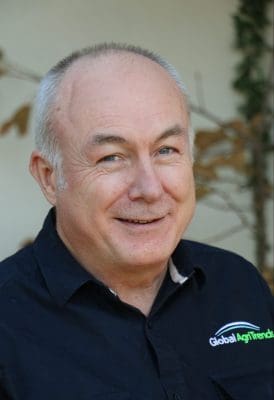ENSURING Australia’s meat production sector remains competitive while reducing greenhouse gases in the global carbon economy are potential benefits of a Churchill fellowship to be undertaken by industry analyst Simon Quilty.
From February to May this year, Mr Quilty will travel through New Zealand, the United States, Canada, the Netherlands, Ireland and the United Kingdom, looking at methane and GHG reduction schemes.

Global AgriTrends CEO Simon Quilty.
“I’ll be looking at the successes and failures and how we reward our farmers,” he said.
“I want to learn what global ag GHG (greenhouse gas) schemes had the best adoption rate by farmers and the worst.”
He aims to determine which structures work best, comparing the rate of adoption and the government policies in place, and their relevance to the livestock sector.
As chief executive of Global AgriTrends Pty Ltd, Mr Quilty annually explains global meat and livestock trends to hundreds of Australian farmers, lotfeeders and meat processors to assist their business strategies. He expects his fellowship findings to help educate market participants in understanding and participating in current and future reduction schemes.
Mr Quilty said GHG rewards for farmers could be market-driven, such as selling carbon-neutral beef and milk.
“In some countries, this has been successful, and in others not been successful. Equally, GHG offset schemes have had mixed results.”
He said having well-structured schemes will ensure the sustainability of the Australian red meat industry.
In California, Mr Quilty will investigate the state’s Cap-and-Trade program and examine current GHG reduction target schemes in the livestock sector.
In Alberta, Canada, he will examine the slow adoption of agricultural GHG reduction schemes and in the Netherlands Mr Quilty will focus on mitigation through manure management and feed additives in the dairy sector.,
In the United Kingdom, Mr Quilty will study the methodology of of supply chain ecosystem service expert Dr Karl Behrendt and in Ireland he will look at the adoption of country’s advances in low CH4-producing dairy and beef genetics, low CH4 output feed additives and pastures, new vaccines, manure management and low-emission fertilisers.
Demand for carbon offset from farmland will increase
Professor of Sustainable Agriculture at the University of Melbourne Dr Richard Eckard supported Mr Quilty’s fellowship application.
Dr Eckard said demand for carbon offsets from the land sector will only increase.
“One of the major problems in carbon markets in agriculture is that most of the revenue does not flow to farmers.
“The countries targeted have a track record of environmental schemes, with some successes and failures that can be very instructive in guiding Australia into a carbon-neutral agriculture future,” he said.
Dr Eckard said although Australia’s red meat sector has set a carbon neutrality target by 2030, but how this is to be achieved is yet to be fully determined. The incentives required will need further policy reform that the project will inform, he said.
